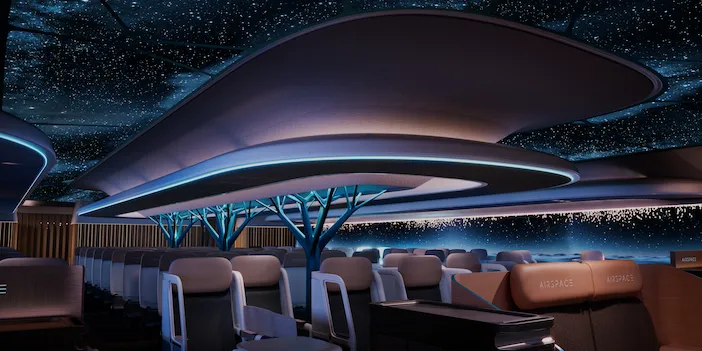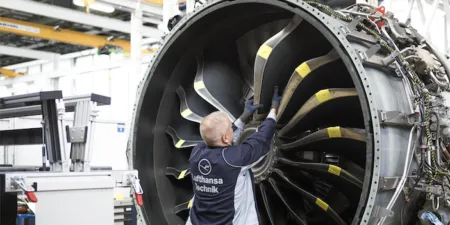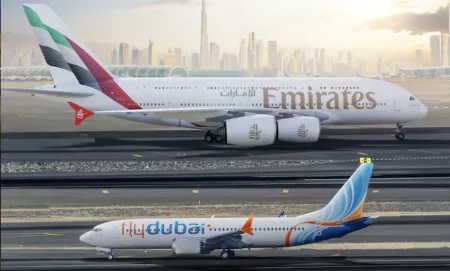The Crystal Cabin Award is a fantastic opportunity for the wider world to see how aerospace companies, designers and engineering teams are innovating to revolutionise the flying experience. The annual Award sees a specialist judging panel consider the finest ideas that can enhance the inflight experience for both passengers and airlines, and give recognition where it is due.
Following an initial vetting process, 72 entries made it through to the 2024 shortlist, split into eight categories: Cabin Concepts, Cabin Systems, Health & Safety, IFEC & Digital Services, Material & Components, Passenger Comfort, Sustainable Cabin, and University. A second voting process has now seen the list whittled down to 25 finalists. So who is in the running?
Cabin Concepts
Each concept selected in this category represents excellence in aircraft cabin design.
The BermudAir Aisle Class Suite, an innovation by London-based studio, Factorydesign, and Bermuda-based airline, BermudAir, is an interesting approach to sustainable design, with pairs of economy-class seats repurposed to create luxurious single-aisle business-class seats. You can read the details in the March issue of Aircraft Interiors International.
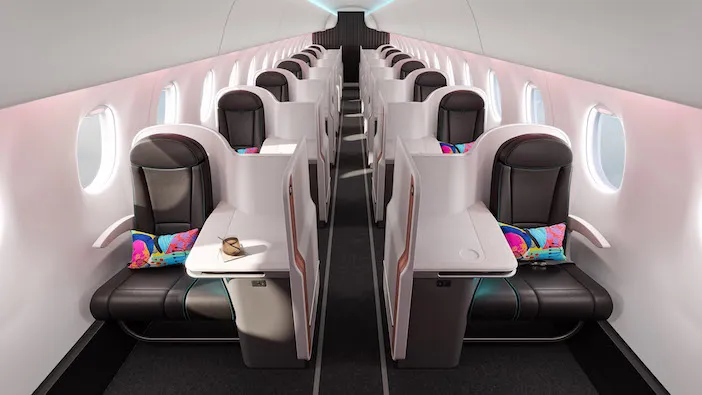
Another finalist selected by the jury for the Cabin Concepts category is the Airspace Cabin Vision 2035+ by Airbus Operations GmbH (pictured top). The concept focuses on lightweight construction and the circular economy to reduce negative environmental impacts, with the goal of reducing cabin weight by up to 40%. The design also includes digitally supported, waste-reducing catering concepts.
The third finalist in this category is the Japan Airlines (JAL) Airbus A350-1000 cabin interior, a beautiful design that blends tradition and modernity. The interior, created by the Tangerine studio, in collaboration with JAL, Safran Seats and Recaro Aircraft Seating, seamlessly weaves Japanese aesthetics with modern flight comfort to create a harmonious and tranquil space above the clouds.
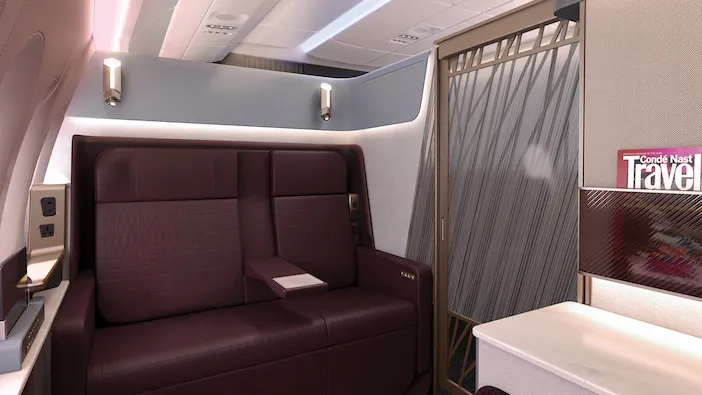
Cabin Systems
The Cabin Systems category recognises innovation in areas such as aircraft cabin energy efficiency and spatial flexibility.
One finalist is GeniusPOWER Core by KID-Systeme, with intelligent charging options that enable passengers to charge their personal electronic devices such as smartphones and tabletsduring flight. Each compact power converter can efficiently power up to nine devices.
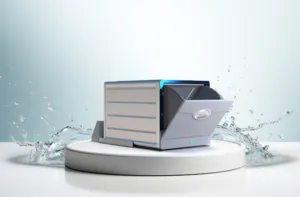
Meanwhile ‘The Cube’ by Safran Cabin is a solution that gives cabin crew a way to cleanly dispose of food and liquid waste in the galley. The Cube integrates seamlessly into the overall appearance of a galley and maintains a hygienic workspace by activating UV light upon closure, which eliminates odours and prevents the growth of bacteria.
The third finalist in this category is Burrana, with RISE Power, an advanced in-seat power supply system. Key features include a low weight of only 200 grams per seat, cost-effective installation without requiring re-certification of the seat, and fast charging of passengers’ personal devices.
Health & Safety
The Health & Safety category recognises innovative products that enhance safety and accessibility in aviation.
One finalist is Accessible IFE, an accessible in-flight entertainment (IFE) product designed by Safran Passenger Innovations (SPI) in collaboration with Air New Zealand and Virgin Atlantic, which allows passengers with auditory, visual, cognitive, and motor impairments to enjoy the onboard entertainment.
On the safety side, the AirPRO by Schroth Safety Products is a passenger lap-belt airbag, developed in cooperation with the Teams Design Hamburg and DesignBüro Stühmer|Scholz design studio in Hamburg. The belt combines an integrated airbag with crash sensor technology under the seat, which quickly activates the airbag in the event of an impact, and is designed for adaptability to different cabin designs.
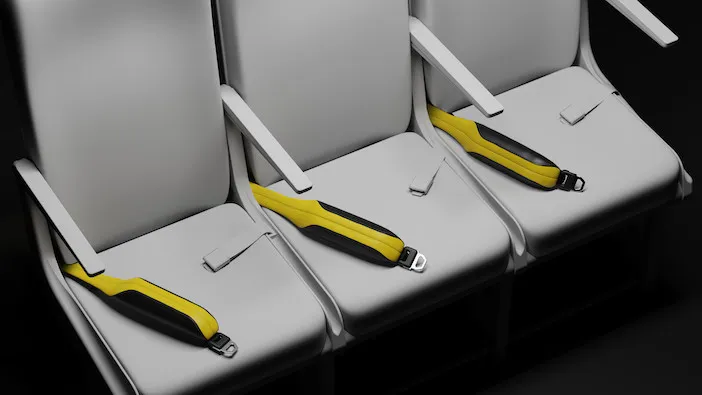
Lastly, the Accenture PED safety bag by Accenture GmbH is a safety solution for containing personal electronic device issues during flight – critical in order for a small lithium battery failure not to become a big safety issue in the cabin. The bag meets the highest standard for containing events with electronic devices, ensuring 100% containment of fire, smoke, and toxic gases.
Passenger Comfort
The wellbeing and comfort of passengers on long and medium-haul flights can be improved by the finalists in the Passenger Comfort category of the Awards.
Comfort will be a big concern for passengers on the upcoming Qantas ‘Project Sunrise’ flights, which will last up to 22 hours. They will be pleased to access the onboard Wellbeing Zone, created by Diehl Aviation in collaboration with Qantas Airways, which is an area between the economy and premium economy cabins where passengers can stand, stretch and use the self-service snack and drink station.
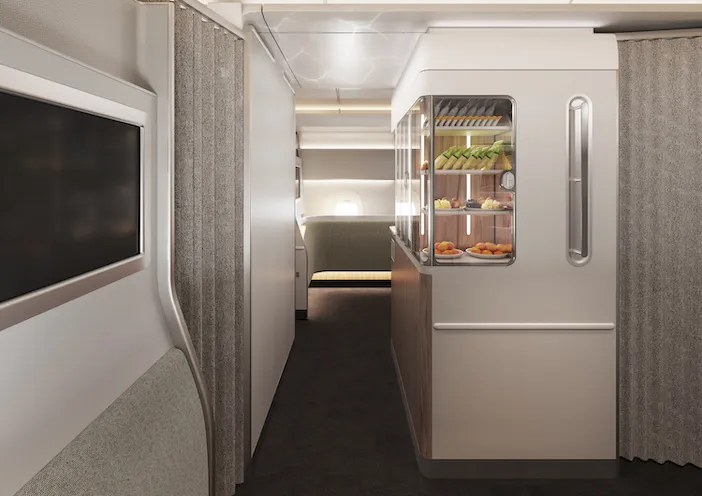
The Signature seat by Safran Seats will also be welcomed by economy-class flyers, a design which gives personal space to each passenger through a fixed pre-reclined backrest architecture that is adjustable for different body types. The seat is optimised for both long and medium-haul flights.
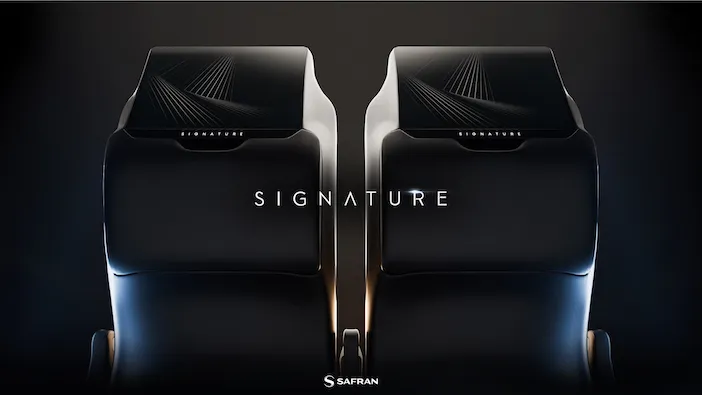
The third finalist, the Arise intelligent comfort system by Collins Aerospace, is a smart seat comfort mechanism that uses sensor technology and advanced materials to reduce the main disturbances of sleep during flight – discomfort caused by body temperature, pressure distribution, and vibration. The system automatically adjusts seat position, cushion pressure and environmental conditions, based on real-time data analysis.
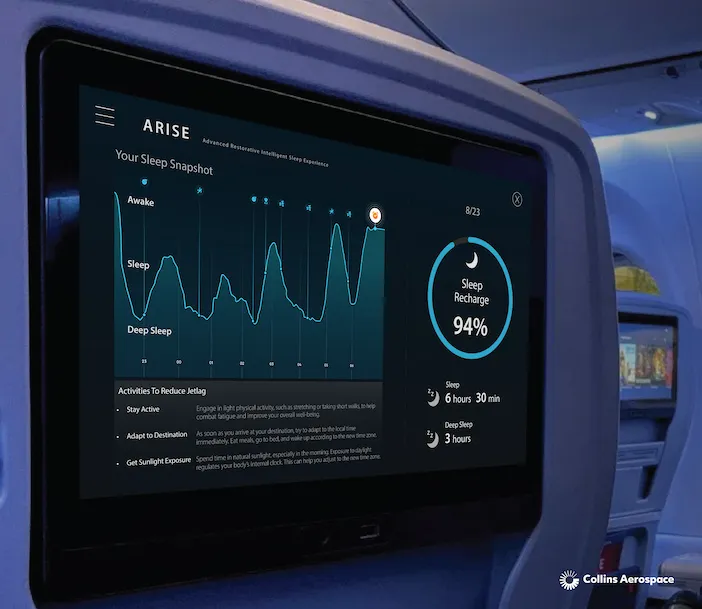
IFEC & Digital Services

Advanced inflight entertainment and connectivity (IFEC) technologies revolutionise the way passengers interact with digital services onboard, and demand is high – from watching movies on the seatback display to accessing emails, sending text messages, surfing the internet, stream the latest TV content, or face-timing onboard. With the fast-paced world of electronics, the IFEC & Digital Services category is always highly competitive.
For example, Intelsat is in the running with Multi-Orbit Connectivity, which provides improved internet services onboard aircraft by combining geostationary (GEO) satellites and low-Earth orbit (LEO) satellites to enable faster speeds and lower latencies, to keep data-hungry passengers happy.
Collins Aerospace is also in this category, with the ADAPT system that allows passengers to control their seat, the in-flight entertainment system, and onboard service using their personal mobile devices, with individual settings automatically integrated. The platform supports advanced functions such as voice control, American Sign Language gesture recognition, and audio-visual feedback, enhancing accessibility for users.
Meanwhile FlytEdge, developed by Thales Avionics, is the first cloud-based, digital IFE solution that enables the integration of web applications and streaming services, as well as real-time updates of software and content. The platform simplifies airline operations and enhances the passenger experience through ongoing innovations and an open architecture.
Materials & Components
Innovative solutions are central to the Materials & Components category, based on advanced manufacturing technologies, sustainable materials, and efficient designs that can reduce weight, increase efficiency, and minimise the environmental impact of flying.
For example, STARLight by Collins Aerospace (they are doing well this year) is a structural technology that uses advanced composite designs, robotic manufacturing, and sustainable materials to reduce the weight of aircraft components while also lowering manufacturing costs. This technology enables airlines to efficiently design their cabin spaces without adding extra weight, and offers enhanced thermal and acoustic insulation properties.
Many passengers in business class enjoy the privacy provided by the doors on many modern suites. However, doors can add complexity and weight, and are sometimes challenging to certify. Inspired by the 1,000-year-old art of origami, Unum Aircraft Seating, in collaboration with MGR Foamtex, has developed ‘Door 2.0 – The Zen Privacy Door’, a foldable privacy door for business-class suites with a simplified, lightweight design that can be easier to certify.
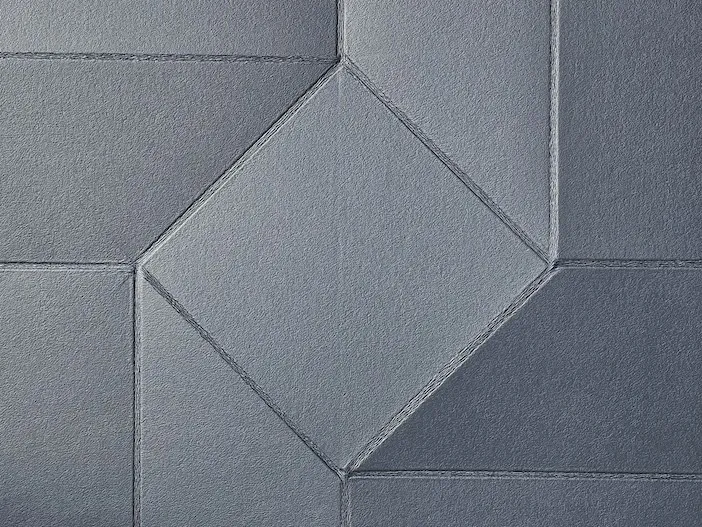
The third finalist, the ECO Bracket, is an innovative bracket developed by Diehl Aviation and 9T Labs, made from recycled thermoplastic production waste and featuring an advanced manufacturing process that optimises load distribution and mechanical performance. Diehl Aviation says the product enables a reduction in weight, reduces production costs by 50%, supports the reduction of CO2 emissions, and promotes the reuse of resources at the end of the components’ lifecycle.
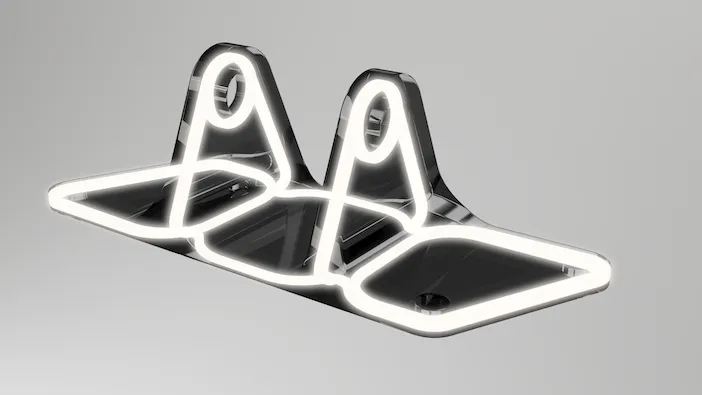
Sustainable Cabin
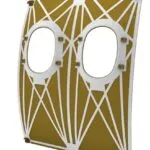
The submissions in the Sustainable Cabin category all aim to set new standards in terms of sustainability in aircraft cabins. The innovations use environmentally friendly materials and technologies to reduce the CO2 footprint, minimise waste, and improve resource efficiency, while also optimising the passenger experience.
Diehl Aviation is also competing again, with the ECO Sidewall, an innovative sidewall concept for aircraft cabins which, through the use of lightweight materials and advanced technologies, achieves a claimed weight reduction of 10% and a reduction in CO2 emissions of 10% during operation. The sidewall integrates environmentally friendly technologies that significantly reduce production waste and thus contribute to more sustainable cabin designs.
The ‘R Sphere’ by Recaro Aircraft Seating is a seating concept that uses sustainable materials such as cork, wood, recycled fishing nets, and cactus. Recaro claims that substituting traditional economy-class seats with the R Sphere seat can reduce CO2 emissions by 63 tonnes per aircraft annually, with another benefit being that it is 100% recyclable at the end of its lifecycle.
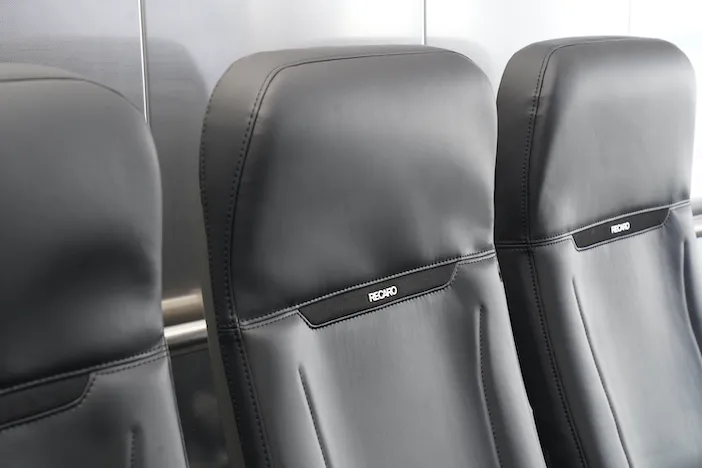
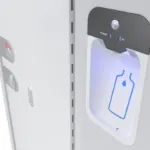 Meanwhile the Onboard Water Dispenser by Safran Cabin uses the existing water supply of the aircraft to enable passengers to fill their own bottles on board at stations installed near the toilets and galleys. UV filter technology is used to ensure the cleanliness of the drinking water. The solution reduces the need for passengers to purchase and dispose of water bottles, optimises stock management, and removes the need for cabin crew to distribute and dispose of plastic bottles and cups.
Meanwhile the Onboard Water Dispenser by Safran Cabin uses the existing water supply of the aircraft to enable passengers to fill their own bottles on board at stations installed near the toilets and galleys. UV filter technology is used to ensure the cleanliness of the drinking water. The solution reduces the need for passengers to purchase and dispose of water bottles, optimises stock management, and removes the need for cabin crew to distribute and dispose of plastic bottles and cups.
University
The University category is always interesting, with a little more unfettered imagination. There is a sense of real-world application, through innovative collaborations between universities and industry partners that aim to address common problems in aircraft cabins.
For example, the limited space in economy-class cabins often leads to restricted body posture and a lack of privacy. Flexifold by Tongji University, in collaboration with Dupont, is an economy-class seat concept that provides improved body support through an innovative ‘fold-and-snap’ mechanism. The seat integrates lightweight and breathable materials in a sandwich structure and offers modular adjustment options for privacy, lying angle, and foot support to enhance comfort in cramped cabin spaces.
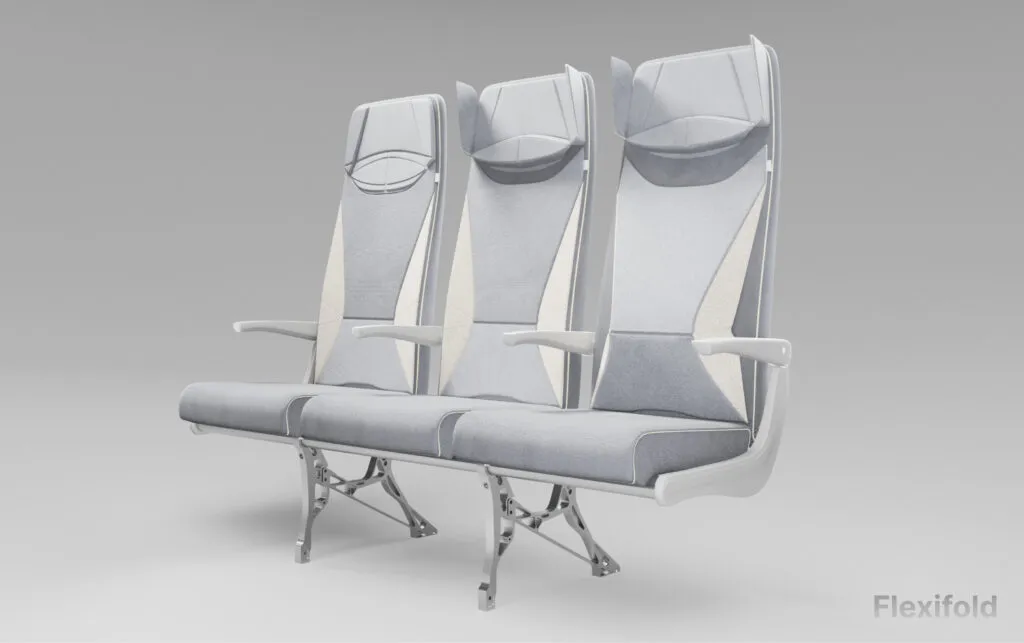
The grandly named ‘Silentium in Excelsis’ concept from the University of São Paulo in cooperation with Embraer is an aircraft noise-cancelling device. It uses artificial intelligence and directs sound waves specifically at the passengers’ heads to reduce the white noise created by the aircraft engines, enabling users to work, sleep or converse without the use of headphones, by locally reducing noise disturbances.
Silvacomfort – also an entry by the University of São Paulo in cooperation with Embraer – is a cabin system that uses sensor technology and artificial intelligence to individually adjust environmental conditions for each passenger, by modifying temperature, lighting and sound, based on the respective profile of the passenger. The system integrates discreet cameras, sound recording devices, and temperature sensors into the cabin architecture to anticipate passenger needs and adjust the settings of air conditioning, light, and background music accordingly, while data processing occurs centrally to protect privacy.
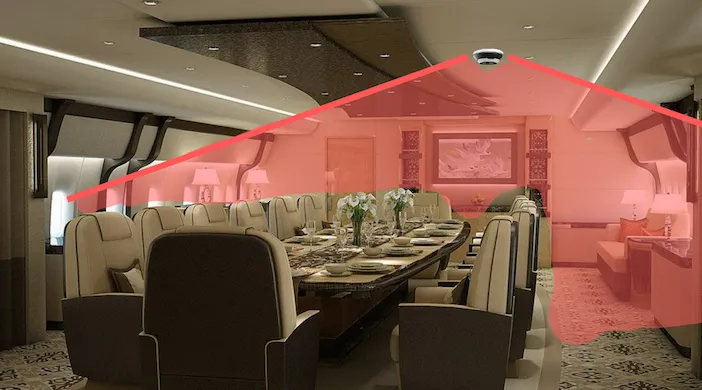
And last but certainly not least, the Wheelchair Space and Securement System (WSSS), developed by a student team from Virginia Tech in cooperation with Boeing, All Wheels Up, and Collins Aerospace, allows passengers with limited mobility to sit securely in their own wheelchairs during flight. The system is integrated into the seating configuration of an economy-class cabin and can be flexibly adapted when not in use, to minimise revenue losses for airlines.
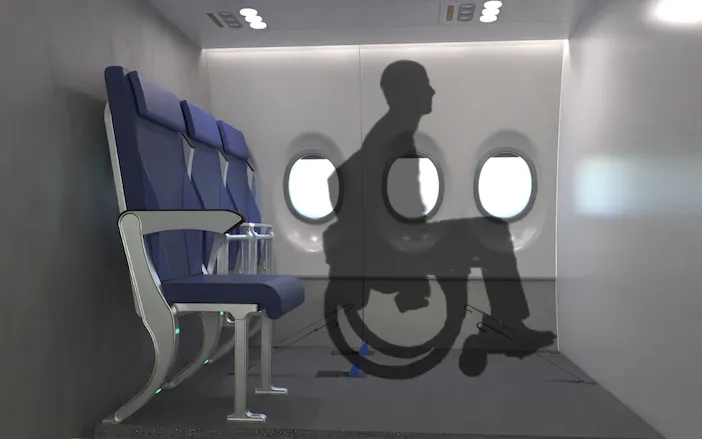
What’s next?
The finalists will have the opportunity to present their concepts in person to the Crystal Cabin Award judging panel at an assessment event on the day prior to Aircraft Interiors Expo 2024 (28-30 May in Hamburg). The winners of the 2024 Crystal Cabin Awards will be announced on the evening of 28th May at a gala dinner at the Hamburg Chambers of Commerce. The Awards are an initiative of the Hamburg Aviation cluster.


